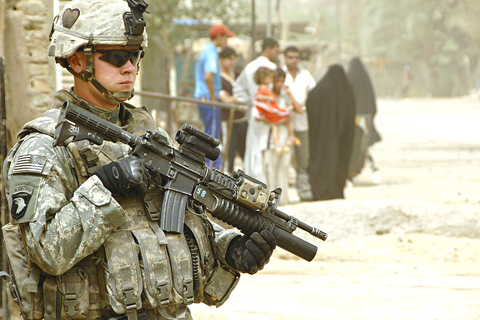Iraq’s government hopes to bring the entire country under its security control by year’s end. But one critical area stands in the way: the western province of Anbar, where the Sunni insurgency was born and later received its first blows from a civil uprising.
The transfer from US military authority in Anbar has become stalled by worries that a hasty move could tempt unrest and reopen rivalries — drawing in the same armed Sunni factions that the US courted to help uproot al-Qaeda in Iraq.
The cautious approach also apparently reflects a desire by Washington not to risk any new complications while Iraqi leaders tussle with a host of messy problems, including seeking agreements on holding provincial elections and opening oil fields to foreign investors.

PHOTO: AFP
Talks on Anbar — a vast swath stretching from near Baghdad to the western borders — have moved into the slow lane after much fanfare last month when the planned transfer to Iraqi security control was announced and then abruptly put on hold.
The biggest issue in the holdup is the fear that internal political rivalries in Anbar could escalate into open conflict without US troops as a buffer.
On one side is the old-guard political leadership in Anbar, known as the Iraqi Islamic Party. The other emerging power is the Awakening Council movement — the groups that turned against al-Qaeda last year and helped stir a wider Sunni backlash against the insurgency across Iraq.
The challenge is how to pull out US control without either side feeling it is sacrificing influence or facing pressure from the Shiite-led Iraqi military forces that could step in.
The internal intrigue in Anbar is already growing. Both sides are jockeying ahead of provincial elections that Iraq hopes to hold this fall.
Further rifts could provide an opening for al-Qaeda to try to regain some footing in Anbar, where insurgents still manage to stage infrequent — but significant — attacks.
Last month, a group linked to al-Qaeda in Iraq claimed responsibility for a suicide bombing near Fallujah that killed more than 20 people, including three US Marines and prominent sheiks who had turned against the insurgents. One of the Marines commanded the battalion in the area.
A day after the attack, the US military announced the postponement in the ceremonies to handing over Anbar province to Iraqi security control. The statement said a “new date will be announced as soon as it is made available.”
Iraqi officials have hinted at a date sometime after the provincial elections, which are scheduled for Oct. 1.
Sheik Abdul-Karim al-Assal, deputy head of the Anbar Awakening Council, said a security blueprint has been presented to the government. The proposal seeks to bring the Awakening groups into the official security fold.
“We have the ability of maintaining the security of the province along with Iraqi police and army after the handover,” he said.
Mouwaffak al-Rubaie, Iraq’s national security adviser, has said negotiations on Anbar are at “a delicate stage” and cannot be rushed. Still, on Wednesday’s security handover in the southern province of Qadisiyah, he said Iraqi leaders hope to have their military and police in full charge of the entire country by the end of year.

Archeologists in Peru on Thursday said they found the 5,000-year-old remains of a noblewoman at the sacred city of Caral, revealing the important role played by women in the oldest center of civilization in the Americas. “What has been discovered corresponds to a woman who apparently had elevated status, an elite woman,” archeologist David Palomino said. The mummy was found in Aspero, a sacred site within the city of Caral that was a garbage dump for more than 30 years until becoming an archeological site in the 1990s. Palomino said the carefully preserved remains, dating to 3,000BC, contained skin, part of the

‘WATER WARFARE’: A Pakistani official called India’s suspension of a 65-year-old treaty on the sharing of waters from the Indus River ‘a cowardly, illegal move’ Pakistan yesterday canceled visas for Indian nationals, closed its airspace for all Indian-owned or operated airlines, and suspended all trade with India, including to and from any third country. The retaliatory measures follow India’s decision to suspend visas for Pakistani nationals in the aftermath of a deadly attack by shooters in Kashmir that killed 26 people, mostly tourists. The rare attack on civilians shocked and outraged India and prompted calls for action against their country’s archenemy, Pakistan. New Delhi did not publicly produce evidence connecting the attack to its neighbor, but said it had “cross-border” links to Pakistan. Pakistan denied any connection to

TRUMP EFFECT: The win capped one of the most dramatic turnarounds in Canadian political history after the Conservatives had led the Liberals by more than 20 points Canadian Prime Minister Mark Carney yesterday pledged to win US President Donald Trump’s trade war after winning Canada’s election and leading his Liberal Party to another term in power. Following a campaign dominated by Trump’s tariffs and annexation threats, Carney promised to chart “a new path forward” in a world “fundamentally changed” by a US that is newly hostile to free trade. “We are over the shock of the American betrayal, but we should never forget the lessons,” said Carney, who led the central banks of Canada and the UK before entering politics earlier this year. “We will win this trade war and

Armed with 4,000 eggs and a truckload of sugar and cream, French pastry chefs on Wednesday completed a 121.8m-long strawberry cake that they have claimed is the world’s longest ever made. Youssef El Gatou brought together 20 chefs to make the 1.2 tonne masterpiece that took a week to complete and was set out on tables in an ice rink in the Paris suburb town of Argenteuil for residents to inspect. The effort overtook a 100.48m-long strawberry cake made in the Italian town of San Mauro Torinese in 2019. El Gatou’s cake also used 350kg of strawberries, 150kg of sugar and 415kg of